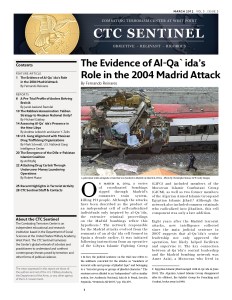Cover Story Overview
The Evidence of Al-Qa`ida’s Role in the 2004 Madrid Attack
By Fernando Reinares
On March 11, 2004, a series of coordinated bombings ripped through Madrid’s commuter train system, killing 191 people. Although the attacks have been described as the product of an independent cell of self-radicalized individuals only inspired by al-Qa`ida, the extensive criminal proceedings on the Madrid bombings refute this hypothesis. Eight years after the Madrid terrorist attacks, new intelligence collected since the main judicial sentence in 2007 suggests that al-Qa`ida’s senior leadership not only approved the operation, but likely helped facilitate and supervise it. The key connection between al-Qa`ida’s central leadership and the Madrid bombing network was Amer Azizi, a Moroccan who lived in Madrid for a decade until November 2001. This article first recounts how Azizi became a key member of the Abu Dahdah cell, where he forged connections with the men who would later execute the Madrid attacks. It then provides a chronological narrative of how the decision to attack Spain was made, as well as Azizi’s role in the formation of the bombing network.
 Skip to content
Skip to content

